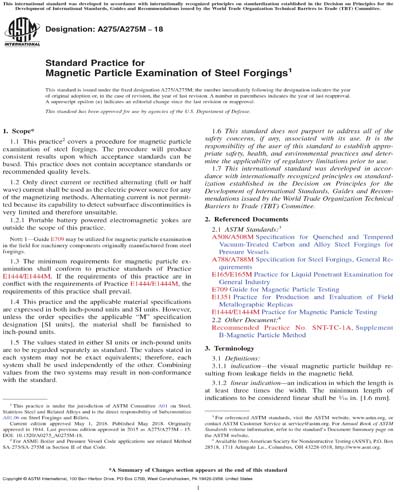Historical
ASTM A275/A275M-18
Standard Practice for Magnetic Particle Examination of Steel Forgings
1.1 This practice2 covers a procedure for magnetic particle examination of steel forgings. The procedure will produce consistent results upon which acceptance standards can be based. This practice does not contain acceptance standards or recommended quality levels.
1.2 Only direct current or rectified alternating (full or half wave) current shall be used as the electric power source for any of the magnetizing methods. Alternating current is not permitted because its capability to detect subsurface discontinuities is very limited and therefore unsuitable.
1.2.1 Portable battery powered electromagnetic yokes are outside the scope of this practice.
Note 1: Guide E709 may be utilized for magnetic particle examination in the field for machinery components originally manufactured from steel forgings.
1.3 The minimum requirements for magnetic particle examination shall conform to practice standards of Practice E1444/E1444M. If the requirements of this practice are in conflict with the requirements of Practice E1444/E1444M, the requirements of this practice shall prevail.
1.4 This practice and the applicable material specifications are expressed in both inch-pound units and SI units. However, unless the order specifies the applicable “M” specification designation [SI units], the material shall be furnished to inch-pound units.
1.5 The values stated in either SI units or inch-pound units are to be regarded separately as standard. The values stated in each system may not be exact equivalents; therefore, each system shall be used independently of the other. Combining values from the two systems may result in non-conformance with the standard.
1.6 This standard does not purport to address all of the safety concerns, if any, associated with its use. It is the responsibility of the user of this standard to establish appropriate safety, health, and environmental practices and determine the applicability of regulatory limitations prior to use.
1.7 This international standard was developed in accordance with internationally recognized principles on standardization established in the Decision on Principles for the Development of International Standards, Guides and Recommendations issued by the World Trade Organization Technical Barriers to Trade (TBT) Committee.
ASTM International [astm]

